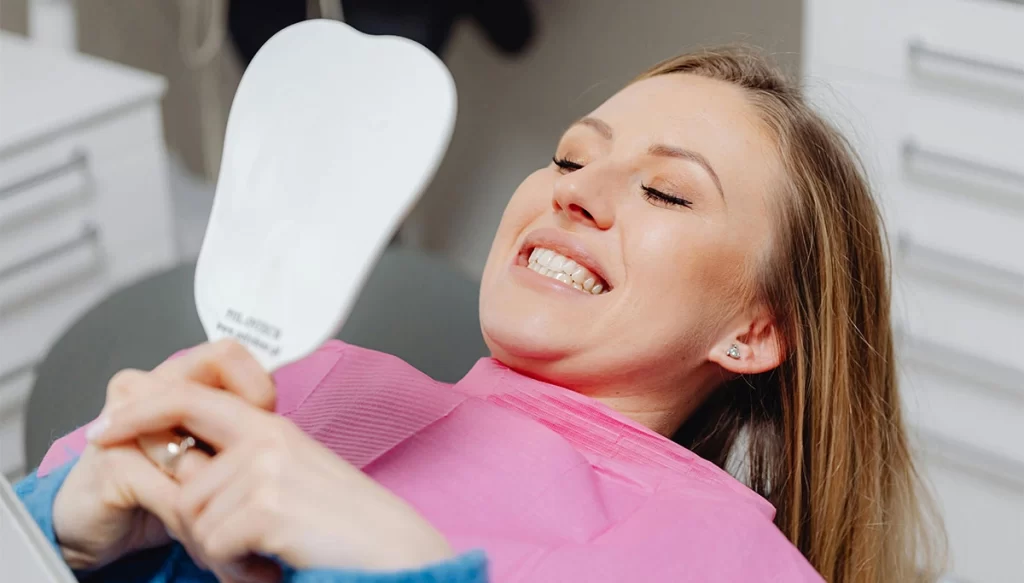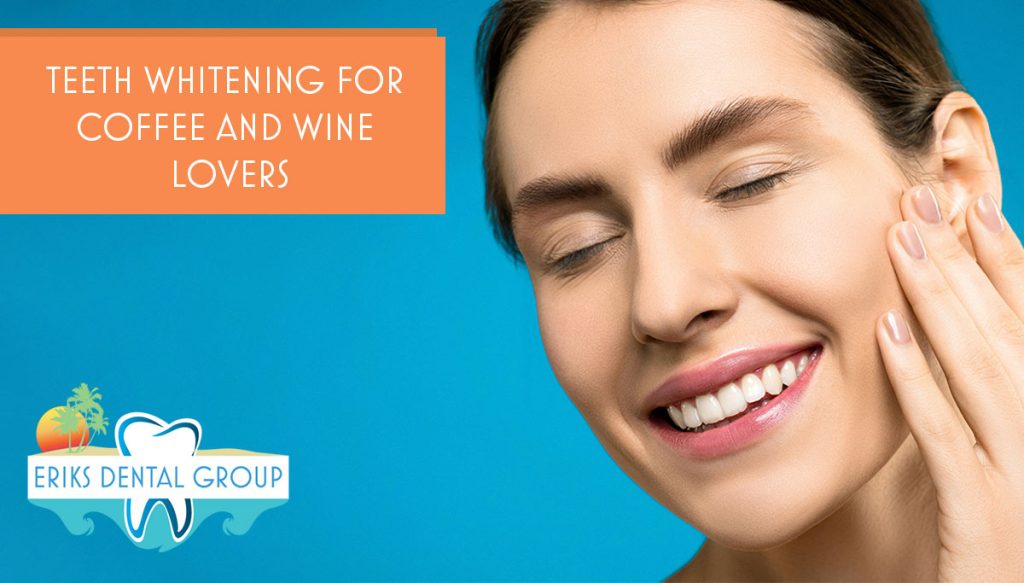Did you know that smiling triggers a chemical reaction in the brain, releasing hormones like dopamine and serotonin? According to data released by a neurologist, smiling can convince your brain to believe you’re happy. However, if you have stained teeth, you might find yourself smiling less often than most.
Teeth whitening offers a quick and painless solution to enhancing your smile. It’s not just about boosting your mood and confidence – an attractive smile can leave a lasting impression. In fact, data from the National Library of Medicine shows that smiling can increase how trustworthy others perceive you.
So, what causes teeth staining? The primary culprits are coffee and wine – two beverages many find hard to give up. But there’s no need to sacrifice your favorites, a visit to your local dentist can help you maintain a bright, confident smile without giving up your daily indulgences.
Does Coffee and Wine Really Stain Your Teeth?
For many, the morning cup of coffee is essential to start the day, and a glass of red wine in the evening is the perfect way to unwind. However, both of these beloved beverages can have an unfortunate impact on your teeth.
The Impact of Coffee on Your Teeth

Coffee contains chromogens, compounds that adhere to tooth enamel and cause staining over time. There are other factors to consider as well.
- The acidity of coffee: Coffee is a naturally acidic drink. The level of acidity can vary depending on the type of coffee bean and the brewing method. While the acidity is not necessarily a bad thing, it does contribute to the staining of your teeth. Over time this acidity can weaken your enamel, making it more porous.
- The presence of tannins: Coffee contains something called tannins (a type of polyphenol), though in smaller amounts when compared to other drinks like tea. These tannins also stick to your enamel, leading to more staining.
If you are someone who enjoys coffee throughout the day, you may notice that your teeth have started to lose their natural whiteness over time.
How Does Wine Stain Your Teeth?

Red wine, much like coffee, can stain your teeth. The American Dental Association classifies these stains as extrinsic, meaning they come from colored compounds that come into contact with the enamel. Here’s how wine impacts the color of your teeth.
- It contains anthocyanins: These are the pigments in grapes that give red wine its purplish color. These water-soluble pigments are not good for your teeth.
- The impact of tannins: Tannins, which come from grape skins, stems, and seeds, can bind the colored pigment to your teeth
- The acidity: Like coffee, red wine is acidic which makes your enamel more porous.
The Effect of Teeth Whitening on Stains
Fortunately, coffee and wine stains can be effectively treated. A qualified dentist can remove these stains using safe whitening agents that penetrate the enamel and break down the stain molecules, resulting in a brighter smile. Most patients see dramatic improvements after just one professional treatment.
Professional vs. At-Home Whitening
There’s a wide variety of at-home products available for whitening your teeth ranging from strips and toothpaste to at-home whitening kits. However, these products often fall short of the results achieved through professional treatment.
Here’s why professional whitening is the better choice:
- Effectiveness: Professional treatments use higher concentrations of active ingredients, resulting in faster and more noticeable results.
- Safety: Dentists assess your oral health to ensure the whitening process is safe and minimize any risk of sensitivity or damage.
- Customization: Professional whitening is tailored to your specific needs, whereas at-home kits offer a one-size-fits-all approach.
- Speed: At-home products can take weeks or months to show results, while professional treatments deliver significant improvements in just one visit.
- Ongoing Support: With a professional, you receive expert advice and support throughout the whitening process, something at-home kits can’t offer.
Teeth Whitening Services in Boynton Beach

At Eriks Dental Group in Boyton Beach, hundreds of residents trust our team for their whitening needs. We provide personalized care and use the latest whitening technology to ensure safe and effective treatments.
Here’s what you can expect from our dental team:
- Comprehensive Consultation: We begin with a thorough examination to understand your dental history and your specific whitening goals.
- Personalized Treatment Plan: Based on your needs and our initial assessment, we create a customized plan to achieve the best possible results.
- State-of-the-Art Equipment: Our clinic is equipped with advanced dental technology for safe and effective whitening treatments.
- Post-Treatment Care: We provide aftercare instructions and tips to help you maintain your new smile.
Ready to enhance your smile, call us at 561-733-4004 or visit our contact page to schedule a consultation. You can also take a look at our teeth whitening guide for more information.
Frequently Asked Questions On Teeth Whitening
Q: Is whitening teeth safe?
A: Yes, when performed by a dental professional, teeth whitening is safe for most individuals.
Q: How long do the results last?
A: Results can last from six months to two years, depending on your oral hygiene and how much stain-causing foods and drinks you consume.
Q: Will whitening hurt my teeth?
A: Some patients may experience mild sensitivity during or after the treatment, but this usually subsides quickly.
Q: Can I whiten my teeth if I have dental work?
A: It all depends on the type of dental work you have had done. This is why we consult with all of our patients first to make sure we tailor the right treatment for their teeth.
Q: How often can I whiten my teeth?
A: It’s generally recommended to wait six months between professional whitening sessions. Always consult your dentist for specific guidance.

